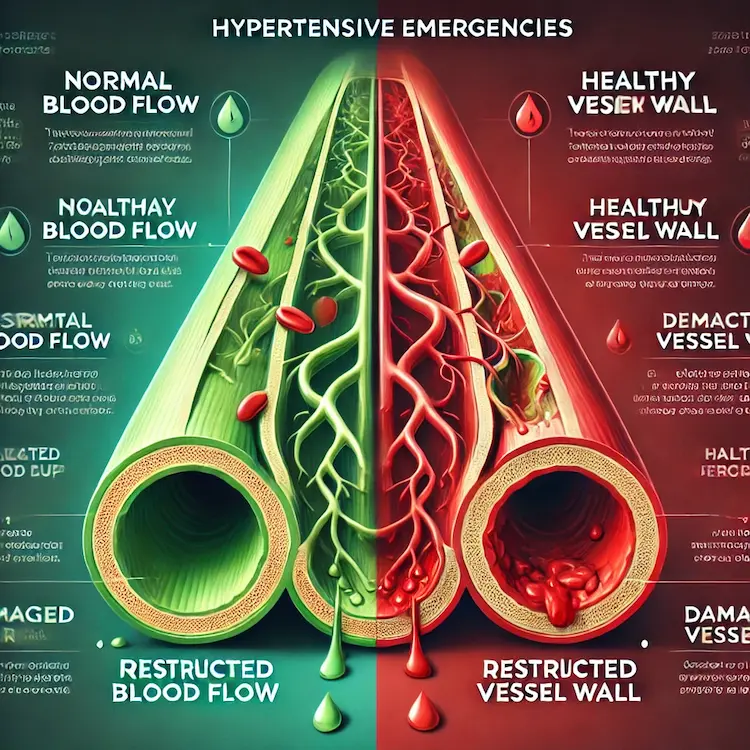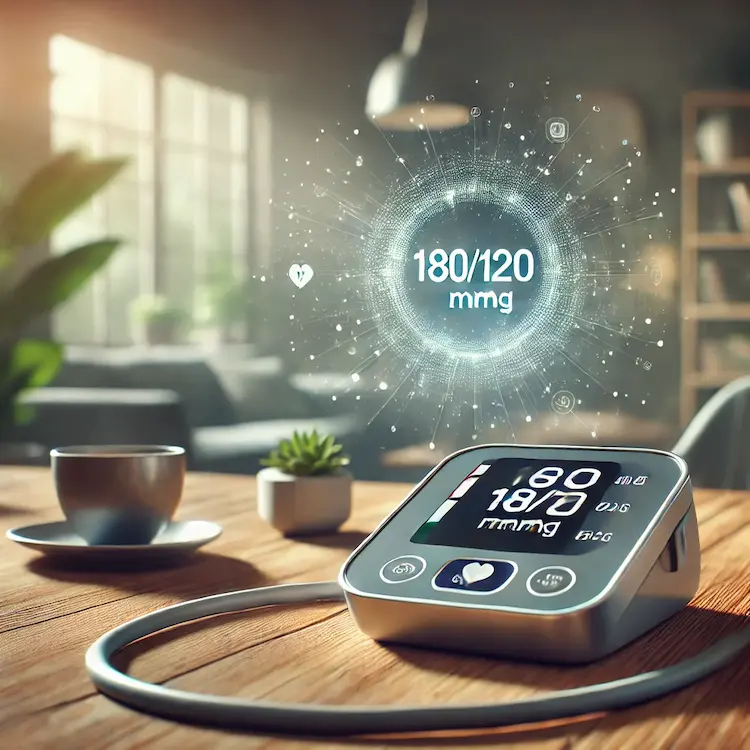Hypertensive emergencies are life-threatening conditions that require immediate medical attention. This occurs when blood pressure rises dramatically (usually exceeding 180/120 mmHg) and causes acute damage to one or more organs, such as the heart, kidneys, brain, or eyes. Left untreated, hypertensive emergencies can lead to severe complications, including stroke, heart attack, or kidney failure.
What Is a Hypertensive Emergency?
A hypertensive emergency is a severe medical condition where extremely high blood pressure leads to target organ damage. This is different from a hypertensive urgency, where blood pressure is elevated without immediate organ damage. The distinction is critical as treatment approaches differ greatly.
Symptoms of Hypertensive Emergencies:
- Severe headache, often accompanied by confusion or vision changes.
- Chest pain or pressure, suggesting cardiac stress.
- Shortness of breath, indicative of heart failure or pulmonary edema.
- Neurological symptoms like seizures, sudden weakness, or loss of consciousness.
- Nausea and vomiting due to increased intracranial pressure.

Common Causes:
- Chronic Hypertension: Poorly managed or undiagnosed hypertension.
- Medication Noncompliance: Stopping antihypertensive drugs abruptly.
- Secondary Hypertension: Underlying conditions like kidney disease or endocrine disorders.
- Pregnancy Complications: Conditions like preeclampsia or eclampsia.
- Substance Abuse: Cocaine and amphetamines can trigger acute blood pressure spikes.
Why Are Hypertensive Emergencies Dangerous?
Hypertensive emergencies are associated with high morbidity and mortality rates if not treated promptly. Here’s how they can impact key organs:
Brain
- Can lead to intracranial hemorrhage, stroke, or hypertensive encephalopathy (swelling in the brain caused by high blood pressure).
- Symptoms include confusion, vision disturbances, and reduced consciousness.
Heart
- Severe hypertension increases the risk of heart attacks, heart failure, or aortic dissection (a tear in the aorta wall).
Kidneys
- Acute kidney injury can result in permanent renal failure requiring dialysis.
- Elevated creatinine levels and reduced urine output are red flags.
Eyes
- Damage to retinal blood vessels can lead to blurred vision or permanent blindness.
Epidemiology and Statistics
- Approximately 1.28 billion adults worldwide suffer from hypertension, according to the World Health Organization.
- Hypertensive emergencies occur in about 1-2% of hypertensive patients each year.
- Without treatment, mortality rates exceed 80% within one year.
Management of Hypertensive Emergencies
Timely intervention is critical in hypertensive emergencies. The primary goal is to rapidly but safely reduce blood pressure to prevent further organ damage. This is achieved through:
Medications
- Intravenous (IV) Antihypertensives:
- Sodium Nitroprusside: Provides rapid blood pressure reduction but requires continuous monitoring due to toxicity risks.
- Labetalol: Effective for most hypertensive emergencies; acts on both alpha- and beta-receptors.
- Nicardipine: Calcium channel blocker, ideal for stroke-related emergencies.
- Oral Antihypertensives:
- Used during stabilization or in hypertensive urgencies (e.g., Clonidine, Captopril).
Monitoring
- Continuous blood pressure monitoring via automated devices or arterial lines.
- Lab tests to assess kidney function (creatinine, BUN), cardiac enzymes, and coagulation profiles.

Hospital Care
- Patients are typically admitted to an intensive care unit (ICU) for close observation and treatment adjustments.
Prevention Strategies
Preventing hypertensive emergencies requires effective blood pressure management and lifestyle changes:
Lifestyle Modifications
- Dietary Adjustments:
- Follow the DASH diet (rich in fruits, vegetables, and low-fat dairy while low in sodium and saturated fats).
- Limit salt intake to less than 2,300 mg per day.
- Regular Exercise:
- Aim for at least 150 minutes of moderate activity per week.
- Weight Management:
- Maintaining a healthy BMI reduces cardiovascular risks.
Medication Adherence
- Take antihypertensive medications as prescribed.
- Do not skip doses or stop medications abruptly without consulting a healthcare provider.
Monitoring
- Regularly check blood pressure at home using validated monitors.
- Keep track of readings to identify trends.
Education and Awareness
- Learn to recognize early symptoms of hypertensive emergencies.
- Seek immediate medical help if warning signs arise.
Comparison of Treatment Approaches
| Aspect | IV Medications | Oral Medications | Lifestyle Changes |
|---|---|---|---|
| Speed of Effect | Immediate | Gradual | Long-term |
| Suitable For | Acute emergencies | Stabilization | Prevention |
| Side Effects | Requires close monitoring | Mild to moderate | None, if done properly |
| Cost | Higher | Moderate | Minimal |
Practical Tips for Managing Hypertension
- Invest in a Reliable BP Monitor: Devices validated by medical institutions ensure accurate readings.
- Keep an Emergency Plan: Know the nearest hospital equipped to handle hypertensive crises.
- Follow Up Regularly: Schedule routine check-ups to monitor treatment effectiveness.
- Adopt a Support System: Involve family or friends to stay accountable for medication adherence and lifestyle changes.
Conclusion
Hypertensive emergencies are preventable and manageable with proper awareness, consistent monitoring, and prompt treatment. Understanding the symptoms, causes, and prevention strategies can save lives and improve outcomes. Remember, managing hypertension is a lifelong commitment that involves collaboration between patients and healthcare providers.


